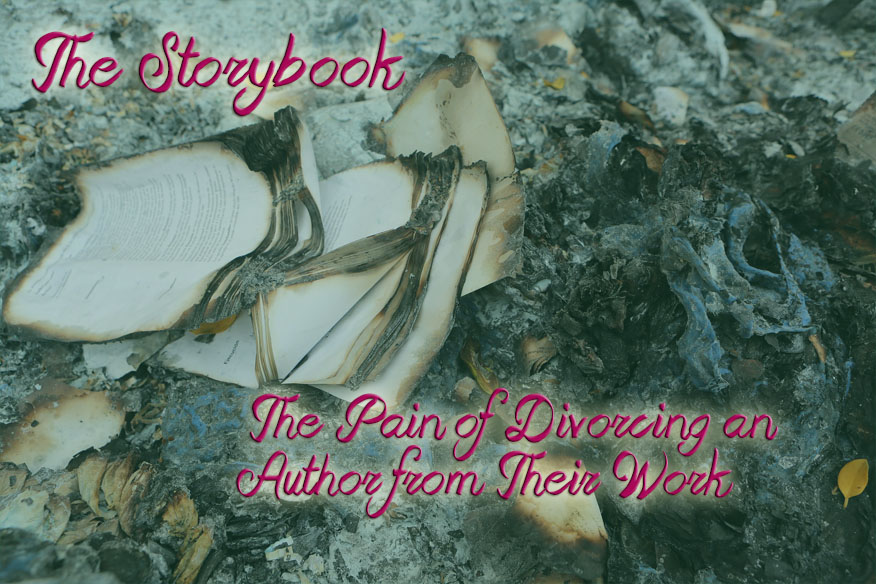Starting off: There was an expression during the Impeachment proceedings that stuck out to me: ‘criticism should be private, praise should be public.’ That pretty succinctly sums up a pillar of my brand and my professional image: I will be vociferous in my praise of work and artists that I like, but my dislike will only be illustrated by my silence on the subject. Which isn’t to say of course, that anyone I DON’T talk about are on my shitlist, lol, but don’t expect me to be one of those authors who gets into wars with other artists on social media.
So, I won’t go into specifics about who I’m talking about, not least because this is a topic that applies to a lot of people, especially at a time in history when someone’s problematic words and actions are on display and subject to consequence. In the wake of the #MeToo movement, the Black Lives Matter movement, and other movements centred around giving voice to disenfranchised people fed up with just taking it, the question has arisen: can you still enjoy the work of someone who proved to hold beliefs or commit actions against your personal morals.
It’s a sticky one. Again, I won’t name specific people, but see if this sounds familiar.
There was a book or series you read in your youth that had a profound impact on you. Maybe it made you feel less alone and more understood, maybe it made you think, maybe it awakened a love of a genre. But then, as you matured and learned more about people and the world, you started to notice things. Outdated gender assumptions, homophobic or racist jokes, that one ageist trope that will not die. And then, the author starts talking on Twitter, and every word they type makes you cringe.
So, should you feel guilty about what you enjoyed as a child? If the work holds up, can you continue enjoying the work without endorsing the things the author says?
To the one, I say no. You were a kid, you’re more mature now, you know better.
But to the second, I tentatively say yes. Art is subjective, it’s not universal and what speaks to you might be meaningless to someone else. And what is problematic to your adult mind was probably completely overlooked when you were young, and something else was formative and possibly even the only light in the darkness to your teenage heart. That emotional connection cannot be denied. You are who you are in part because of the things that were meaningful when you were young. The fact that you matured into a more compassionate and understanding person in spite of exposure to troubling things speaks to the larger messages of that work.
Take what worked, and leave the rest behind.
Concerning the author of those words, they are people, too. Their personal trajectory is not the same as yours or their work. Maybe they slid backward and became more intolerant as they aged- that’s their journey. Their demons shouldn’t diminish how your younger self felt sitting alone in your room with the one thing that understood you. Some people can be educated and helped. Some just have to be cut loose. It hurts, but one thing we all as artists need to make peace with is that once our work is out there and the people get to engage with it, it’s no longer ours.
There’s a line in, ‘All the Rowboats’ by Regina Spektor talking about art in galleries, and it goes, ‘It’s their own fault for being timeless/ There’s a price to pay and a consequence.’ Art has to be accessible, that’s the point. It can’t be divorced from the audience, that’s the point. The work is timeless, the author is mortal.
Art can be divorced from the artist.
It can be taken out of their hands and placed in the custody of the fans. We see it with countless fandoms, where the author is completely overshadowed and rendered almost inconsequential by the fans. Fanfiction and fanart is a prime example. Some authors get into it and play along. The ones who dig in are run over and left behind.
Some works of fanfiction and fanart even eclipse the original source material.
So, if you remembered those books with fondness but don’t follow the author and can’t bring yourself to reread, don’t worry about it. It was the 90’s or the 60’s or whatever, the world has changed. It was probably considered quite forward thinking, at the time. They were doing the best they could, presumably. We’ve moved on, we’re doing things differently now. We’re doing the best we can, now. It’s possible that there will be social criticism of my books. I’m not perfect, I’m doing the best I can. I’m learning all the time, too. I have books and authors from my past that I cringe about or wish they would stop tweeting. But I have to remember that what I got from their work says more about me than it does about them.
Take what’s good, and leave the rest behind.
Btw, I welcome fanfics, fanart, cosplay, etc etc. Tag me.

